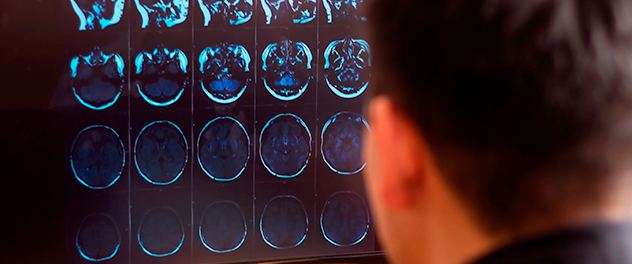 Discovering genes to predict and reduce dementia
Discovering genes to predict and reduce dementia
Findings associated with healthy cognitive aging may lead to interventions that enable people to age better and lead to specific therapies for degenerative brain diseases.
Overview
The research of Neill R. Graff-Radford, M.D., involves discovering genes that cause different degenerative dementias and may help people age without cognitive decline. Findings associated with healthy cognitive aging or dementia may lead to interventions that can mimic the gene effects and allow people to age with less chance of dementia.
Knowing the genes that place patients at risk of a disease may lead to specific therapies for that disease. Dr. Graff-Radford works on different biomarkers that can be used to diagnose specific causes of dementia and monitor the effects of treatment interventions.
The research of Gregg S. Day, M.D., focuses on improving the clinical diagnosis, characterization and treatment of people with common and uncommon causes of dementia. Dr. Day has a special focus on understanding the patient-specific and disease-specific factors that contribute to rapidly progressive forms of Alzheimer's disease, Lewy body disease and frontotemporal lobar degeneration.
Dr. Graff-Radford and Dr. Day's Memory Disorders Lab is engaged in clinical and translational research. The lab is affiliated with the Administrative, Clinical, Neuroimaging and Neuropathology cores of the Alzheimer's Disease Center at Mayo Clinic.
Active grants
- Alzheimer's Clinical Trials Consortium Program studies. Mayo Clinic's Florida campus is a site for the Alzheimer's Clinical Trials Consortium. We take part in multicenter studies to prevent Alzheimer's disease, such as AHEAD and Synaptic Therapy Alzheimer's Research Trial (START). See ClinicalTrials.gov for details.
- Alzheimer's Disease Research Center and affiliated studies. These studies recruit and characterize patients and controls with Alzheimer's disease and related diseases, including minorities.
- ARTFL-LEFFTDS Longitudinal Frontotemporal Lobar Degeneration (ALLFTD). The purpose of this study is to understand how frontotemporal lobar degeneration syndromes progress over time and develop new tools to help with diagnosis and eventual treatment.
- Biomarkers and Rates of Progression in Dementia (Bio-RaPID) study. This study plans to enroll, evaluate, genetically characterize and prospectively apply multimodal (imaging and biofluid) biomarkers to decipher the patient-specific and disease-specific factors that associate with rapid progressive Alzheimer's disease and related dementias.
- Biomarkers for Vascular Contributions to Cognitive Impairment and Dementia (MarkVCID). The purpose of this study is to evaluate and compare the clinical usefulness of plasma-based and MRI-based MarkVCID biomarkers in relation to age, sex, systemic vascular health, race, ethnicity and cognition.
- DLB-U01. The DLB-U01 study enrolls patients with Lewy body disease and measures biomarkers longitudinally.
- Dominantly Inherited Alzheimer Network (DIAN) study. This study recruits and follows families who have one or more members with a dominantly inherited Alzheimer's disease mutation.
- Longitudinal Early-Onset Alzheimer's Disease Study (LEADS). This study recruits and follows patients with early-onset (less than 65 years of age) Alzheimer's disease.
- Mayo Advancing Research Equity in ADRD (MAREAS). This study supports the development of infrastructure to recruit and engage Hispanic or Latino Americans and African Americans in a longitudinal research program designed to characterize the contributions of genetics, medical comorbidities and lifespan influences of structural and social determinants of health — the "exposome" — to disparate burden of Alzheimer's disease and related dementias.